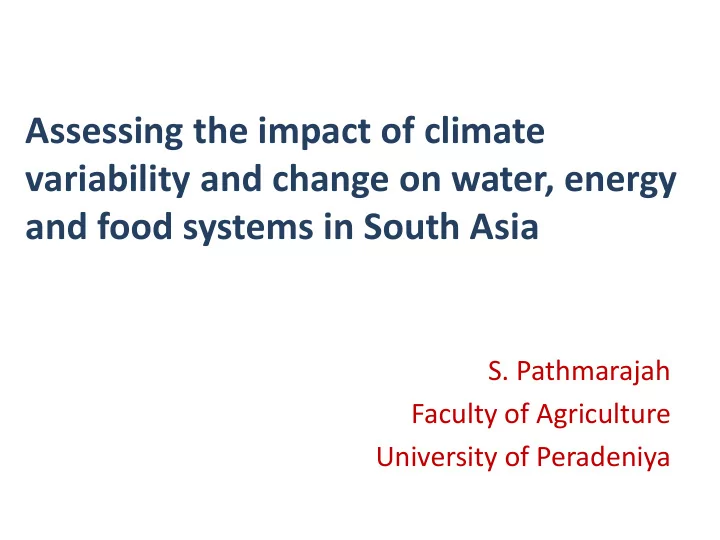

Assessing the impact of climate variability and change on water, energy and food systems in South Asia S. Pathmarajah Faculty of Agriculture University of Peradeniya
Climate variability – what it means to Sri Lanka? • Agro-ecological zones • Water resources • Farming systems • Water, energy and food
Agro-ecological zones Average Rainfall DZ < 1750 mm IZ 1750 - 2500 mm WZ > 2500 mm Elevation Low < 300 m Mid 300 - 900 m Up > 900 m
Water availability and vulnerability Areas vulnerable Rivers and tanks Major climatic zones to drought
Monthly RF (mm) Rainfall pattern 100 150 200 250 300 Monthly RF (mm) 50 0 100 150 200 250 300 350 50 0 Jan Jan Feb Feb Mar Mar Apr Apr May May Jun Jun Jul Jul Aug Aug Sep Sep Oct Oct Nov Nov Dec Dec Monthly RF (mm) 100 150 200 250 300 350 400 50 0 Jan Feb Mar Apr May Jun Jul Aug Sep Oct Nov Dec
Water deficit
Seasonal drought
Other concerns • Decreasing number of wet days • Shift in season • Frequent droughts and floods • Absence climate related policies • Institutional issues
Water Resources
River basins of Sri Lanka • Divided into 103 river basins • Average annual river-flow at 30% of the RF is 40,680 mil m 3 • Mahaweli Ganga drains 16% of the country and carries water from wet to dry Mahaweli zones Ganga • Total length is 332 km. • Catchment area is 10,450 km 2 • Annual discharge is 7,650 mil m 3 • Dammed at least at eight places • Most successful multipurpose, integrated regional development
Groundwater resources of Sri lanka
Surface water resources • Major schemes • Minor schemes Rainwater harvesting Runoff water reuse Flood control Groundwater recharge Environmental benefits
Farming system • Major export crops (Tea, Rubber and Coconut) • Minor export crops (spices) • Rice • Other field crops (OFCs) – Irrigated – rainfed
Energy • Hydropower – Major – Mini • Thermal
Thank you
Recommend
More recommend